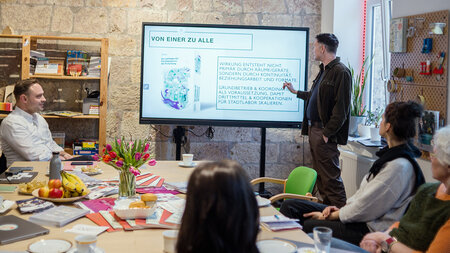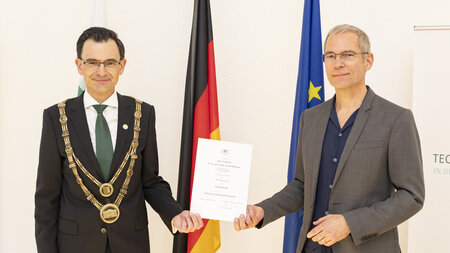M.Sc. Daniel Brand

-
Telefon:+49 371 531-38957
-
E-Mail:
-
Sprechzeiten:Nach Vereinbarung. Bitte kontaktieren Sie mich per E-Mail.
Folgende Bereiche liegen hierbei im Schwerpunkt:
- Kognitive Modellierung
- Prädiktive Modellierung menschlichen Schlussfolgerns
- Syllogistisches Schließen
- Informationssysteme
Berufserfahrung
- seit 02/2022: Wissenschaftlicher Mitarbeiter; TU Chemnitz; Professur Prädiktive Verhaltensanalyse
- 02/2021 - 07/2021: Wissenschaftlicher Mitarbeiter; Syddansk Universitet (SDU); Abteilung für Design und Kommunikation
- 07/2020 - 02/2022: Wissenschaftlicher Mitarbeiter; Albert-Ludwigs-Universität Freiburg; Cognitive Computation Lab
- 05/2017 - 06/2020: Wissenschaftlicher Mitarbeiter; Albert-Ludwigs-Universität Freiburg; Center for Cognitive Science/Cognitive Computation Lab
Bildungsweg und Qualifikationen
- 2016: MSc. Computer Science, Albert-Ludwigs-Universität Freiburg
- 2012: BSc. Computer Science, Albert-Ludwigs-Universität Freiburg
- SS 2022: Dozent; Seminar: Kognitive Ergonomie; TU Chemnitz
- SS 2021: Assistent; Seminar: Cognitive Modeling; Cognitive Computation Lab; Albert-Ludwigs-Universität Freiburg
- SS 2020: Assistent; Seminar: Cognitive Modeling; Cognitive Computation Lab; Albert-Ludwigs-Universität Freiburg
- WS 2019/20: Assistent; Seminar: Cognitive Reasoning: Methods, Algorithms, and Statistics to Discern Human from Artificially Generated Data; Cognitive Computation Lab; Albert-Ludwigs-Universität Freiburg
- SS 2019: Assistent; Seminar: Cross-Domain Modeling of Human Cognition; Cognitive Computation Lab; Albert-Ludwigs-Universität Freiburg
- SS 2014: Tutor; Cloud Computing; Department for Databases and Information Systems; Albert-Ludwigs-Universität Freiburg
- SS 2012: Tutor; Software Engineering; Department for Software Engineering; Albert-Ludwigs-Universität Freiburg
Aktuelle Projekte
- Automatische Prozessmodellgenerierung für Kognitive Modellierung
Vorherige Projekte
- CCOBRA (Cognitive COmputation for Behavioral Reasoning Analysis) Framework: Online predictive modelling of human reasoning. [Website] [GitHub]
- PVA Webexperiment Tools: Sammlung an Vorlagen und Aufgaben für die einfachere Erstellung von Webexperimenten [GitHub]
- Syllogistic Task Predictor: Interaktive Prädiktions-Umgebung für syllogistisches Schlussfolgern [Website]
- Spatial Demonstrator: Interaktive Umgebung für räumliche Schlussfolgerungs-Aufgaben [Website]
- pyTailorshop: Implementation der Tailorshop-Simulation in Python [GitHub]
- Brand, D., & Ragni, M. (2025). Using Cross-Domain Data to Predict Syllogistic Reasoning Behavior. In Barner, D., Bramley, N.R., Ruggeri, A. and Walker, C.M. (Eds.), Proceedings of the 47th Annual Meeting of the Cognitive Science Society (pp. 4370-4377). [Link] [GitHub]
- Todorovikj, S., Brand, D., & Ragni, M. (2025). The Cognitive Complexity of Rule Changes. In Barner, D., Bramley, N.R., Ruggeri, A. and Walker, C.M. (Eds.), Proceedings of the 47th Annual Meeting of the Cognitive Science Society (pp. 461-467). [Link]
- Todorovikj, S., Brand, D., & Ragni, M. (In Press). Empirical Test of a Formal Framework of Forgetting. Proceedings of the 23rd International Conference on Cognitive Modeling.
- Brand, D., Todorovikj, S., & Ragni, M. (2024). Predicting complex problem solving performance in the tailorshop scenario. In Sibert, C. (Ed.), Proceedings of the 22th International Conference on Cognitive Modeling (pp. 30–36). University Park, PA: Applied Cognitive Science Lab, Penn State. [PDF] [GitHub]
- Todorovikj, S., Brand, D., & Ragni, M. (2024). Model verification and preferred mental models in syllogistic reasoning. In Sibert, C. (Ed.), Proceedings of the 22th International Conference on Cognitive Modeling (pp. 185–191). University Park, PA: Applied Cognitive Science Lab, Penn State. [PDF]
- Brand, D., Todorovikj, S., & Ragni, M. (2024). Necessity, Possibility and Likelihood in Syllogistic Reasoning. In L. K. Samuelson, S. L. Frank, M. Toneva, A. Mackey, & E. Hazeltine (Eds.), Proceedings of the 46th Annual Meeting of the Cognitive Science Society (pp. 2776–2782). [Link] [GitHub]
- Brand, D., & Ragni, M. (2023). Effect of Response Format on Syllogistic Reasoning. In M. Goldwater, F. K. Anggoro, B. K. Hayes, & D. C. Ong (Eds.), Proceedings of the 45th Annual Meeting of the Cognitive Science Society (pp. 2408–2414). [PDF] [GitHub]
- Todorovikj, S., Brand, D., & Ragni, M. (2023). Preferred Mental Models in Syllogistic Reasoning. In C. Sibert (Ed.), Proceedings of the 21th International Conference on Cognitive Modeling (pp. 252–258). University Park, PA: Applied Cognitive Science Lab, Penn State. [PDF]
- Brand, D., Riesterer, N., & Ragni, M. (2023). Uncovering Iconic Patterns of Syllogistic Reasoning: A Clustering Analysis. In C. Sibert (Ed.), Proceedings of the 21th International Conference on Cognitive Modeling (pp. 57–63). University Park, PA: Applied Cognitive Science Lab, Penn State. [PDF]
- "Using Cross-Domain Data to Predict Syllogistic Reasoning Behavior" @ CogSci 2025. Online, August 2025. [poster]
- "Effect of Response Format on Syllogistic Reasoning" @ CogSci 2023. Online, July 2023. [poster]
- "Uncovering iconic patterns of syllogistic reasoning: A clustering analysis" @ 21th International Conference on Cognitive Modeling. Online, July 2023. [slides]
- "Do models of syllogistic reasoning extend to generalized quantifiers?" @ 20th International Conference on Cognitive Modeling. Online, July 2022. [slides]
- "Model-based explanation of feedback effects in syllogistic reasoning" @ 19th International Conference on Cognitive Modeling. Online, July 2021. [talk]
- "Unifying models for belief and syllogistic reasoning" @ 43th Annual Meeting of the Cognitive Science Society. Online, July 2021. [slides] [poster]
- "How usable is Galaxy? A usability evaluation of Galaxy" @ 2019 Galaxy Community Conference (GCC2019). Freiburg, Germany, July 2019. [poster]
- "Extending TransSet: An Individualized Model for Human Syllogistic Reasoning" @ 18th International Conference on Cognitive Modeling. Online, July 2020. [short slides] [talk]






